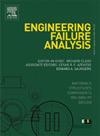船用磁悬浮混流泵失效分析及径向载荷特性研究
IF 5.7
2区 工程技术
Q1 ENGINEERING, MECHANICAL
引用次数: 0
摘要
船用离心泵在维护和备件更换方面面临着巨大的挑战,延长其免维护运行期和使用寿命是一个长期的研究目标。磁悬浮泵配备主动磁轴承(AMBs),实现了非接触、无磨损的支撑机构,同时消除了内部机械密封,从而大大提高了免维护运行时间,延长了使用寿命。针对一种新型船用磁悬浮混流泵装置,研究了倾斜位置部署前试验中发现的轴承过载失效问题。通过对实验数据的分析,将其原因归结为部分负荷工况下泵轴径向载荷的急剧增大。随后,进行了全尺寸计算流体力学(CFD)分析,对径向载荷进行了数值计算,并用实验数据验证了数值方法的准确性。此外,通过提取和分析不同流量下主要径向力源——叶轮-扩压器结构的径向力和流场分布特征,阐明了低流量条件下叶轮-蜗壳结构内径向力突然增大的内在机理。最后,通过数值和实验验证了相似律在不同转速下叶轮径向载荷预测中的适用性。这项研究的结果不仅对磁悬浮泵装置的设计和寿命优化具有重要意义,而且对使用传统机械轴承的泵也具有重要意义,特别是那些部署在海洋环境中,需要在倾斜和摇摆条件下进行非水平安装或操作的泵。本文章由计算机程序翻译,如有差异,请以英文原文为准。
Failure analysis and radial load characteristic study of a magnetic-levitated marine mixed flow pump
Marine centrifugal pumps pose significant challenges in maintenance and spare part replacement, making the extension of their maintenance-free operation period and service life a long-standing research objective. The magnetic levitated pump equipped with active magnetic bearings (AMBs) enables a non-contact, wear-free support mechanism while eliminating internal mechanical seals, thereby substantially enhancing maintenance-free operation duration and prolonging service life. Targeting at a novel marine magnetic levitated mixed-flow pump unit, this study investigates a bearing overload failure observed during pre-deployment testing in inclined position. The study attributed the cause to the sharply increased radial load on the pump shaft under part-load conditions based on experimental data analysis. Subsequently, a full-scale Computational Fluid Dynamics (CFD) analysis was conducted to numerically calculate the radial load, and the accuracy of the numerical method was validated with experimental data. Furthermore, by extracting and analyzing the radial forces and flow field distribution characteristics of the primary radial force source—the impeller-diffuser structure—under varying flow rates, the intrinsic mechanism behind the sudden increase in radial forces within the impeller-volute structure under low-flow conditions was elucidated. Finally, the applicability of the similarity law in predicting impeller radial loads at different rotational speeds was numerically and experimentally validated. The findings of this research hold significant implications not only for the design and lifespan optimization of magnetic levitated pump units but also for pumps utilizing conventional mechanical bearings, particularly those deployed in marine environments where non-horizontal installation or operation under tilting and swaying conditions is required.
求助全文
通过发布文献求助,成功后即可免费获取论文全文。
去求助
来源期刊

Engineering Failure Analysis
工程技术-材料科学:表征与测试
CiteScore
7.70
自引率
20.00%
发文量
956
审稿时长
47 days
期刊介绍:
Engineering Failure Analysis publishes research papers describing the analysis of engineering failures and related studies.
Papers relating to the structure, properties and behaviour of engineering materials are encouraged, particularly those which also involve the detailed application of materials parameters to problems in engineering structures, components and design. In addition to the area of materials engineering, the interacting fields of mechanical, manufacturing, aeronautical, civil, chemical, corrosion and design engineering are considered relevant. Activity should be directed at analysing engineering failures and carrying out research to help reduce the incidences of failures and to extend the operating horizons of engineering materials.
Emphasis is placed on the mechanical properties of materials and their behaviour when influenced by structure, process and environment. Metallic, polymeric, ceramic and natural materials are all included and the application of these materials to real engineering situations should be emphasised. The use of a case-study based approach is also encouraged.
Engineering Failure Analysis provides essential reference material and critical feedback into the design process thereby contributing to the prevention of engineering failures in the future. All submissions will be subject to peer review from leading experts in the field.
 求助内容:
求助内容: 应助结果提醒方式:
应助结果提醒方式:


